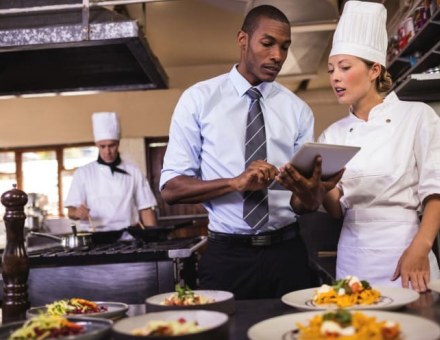The COVID-stricken world in which many businesses have been operating since early-Spring 2020 doesn’t have to be all doom and gloom. Whilst the hospitality industry has felt the financial squeeze as much as any other, the current crisis could just provide the ideal springboard for new talent to revive activity as never before. Martine Ferry, Director of the MSc in International Hospitality Management co-delivered by emlyon business school and the Institut Paul Bocuse, shares this optimistic outlook.

“The global health pandemic has shaken us up in all manner of ways but what it will never change is the innate human desire to meet, mingle, travel to other countries and enjoy good hospitality and food”, begins Martine. “What we are all having to do is just review the ways in which we go about travel and revise our priorities by visiting locally and more eco-responsibly”. This glass-half-full view on the current climate is backed up by statistics, not least how people saw in the end of the very difficult year that was 2020. To take the example of China, internal flights on New Year’s Eve were comparable to those of 2019, suggesting people are finding new ways of enjoying life in some parts of the world, despite the circumstances. So how precisely is the industry itself responding and how can programs such as the MSc in International Hospitality Management prepare the right kind of talents to meet this new challenge and radically different landscape?
From “slow travel” to “les années folles”
Whilst an overnight reversal of fortunes is not expected, Martine sees a new wave in hotel experiences establishing itself. The trend began pre-crisis and will boom, in her opinion, post-crisis as customers seek more personalised and personal (without being over-friendly) hospitality tailored to their needs and tastes. One such example is the independent Paradiso hotel in Paris, a lifestyle hotel designed under the banner of the cinema and thereby appealing to customer’s needs to escape and indulge themselves in their personal taste for film. “In the current situation, people are either reaching out to nature and getting away from urban life a bit or, when in town, are in search of something that appeals to their need to party and enjoy themselves. We can observe a visible sociological swing that will no doubt represent a major boom for the food, beverage, and hotel industries when we emerge from the worst of COVID-19. Travel is at present slow, more regional and more ecologically friendly but we could in all likelihood see a return to the années folles of 1920s France, so keen are people to make the best out of a bad situation. Hotels and restaurants need to get ready for this by adapting in advance”.

Preparing for a boom
This anticipated blossoming of existing trends observed by Martine increases the need for institutions such as emlyon business school and the Institut Paul Bocuse to hone the talents the market will need to carry this projected success through. The MSc program co-delivered by the two schools ticks these boxes and many others, especially via consulting and design projects aimed to hone the conceptual skills of each student whilst also having them work on actual proposals relating to the restaurant and hotel business, successful completion of which could even come to actual fruition in the future. “We want to push the creative minds of our students, nurture a problem-solving attitude and have them devise genuine hotel and restaurant projects that could one day actually open their doors to customers in the post-COVID world we are all so looking forward to.”
Combining skillsets
In the first semester, Hospitality Students have to work with the Culinary Masters’ students to design a restaurant for potential implementation in Lyon For another project, student teams are also invited to analyse the full range of Accor hotels in order to identify the need and space for a new brand therein, with the help of coaching to guide them through analysis of the market and the establishment of a marketing plan. Even in these times of social distancing, lockdowns and remote learning, all students have benefitted from the expert knowledge of no fewer than 28 VIP guest speakers from such diverse backgrounds as hospitality, food courts, lifestyle, consulting, and even campervan companies. The purpose of the program has, for Martine, become even clearer in these troubled times: “any serious business and business professional has to anticipate trends and innovate in order to create. We firmly believe that graduates of the MSc will discover a new hospitality landscape peopled by a different type of customer with different needs than before. We are confident they will overcome to adapt and then go on to succeed.”


